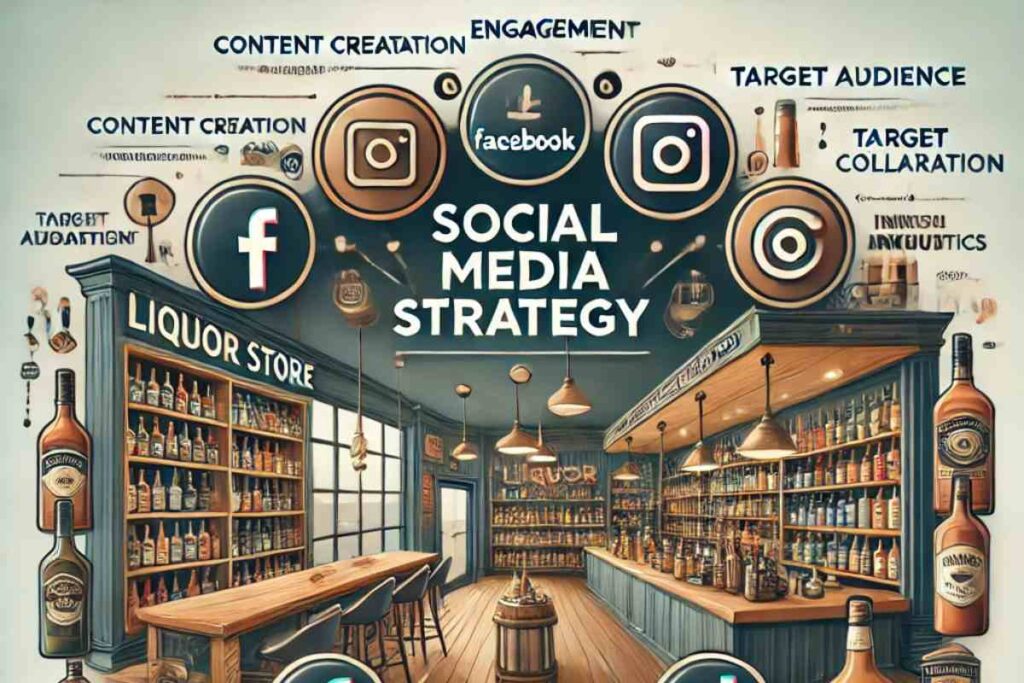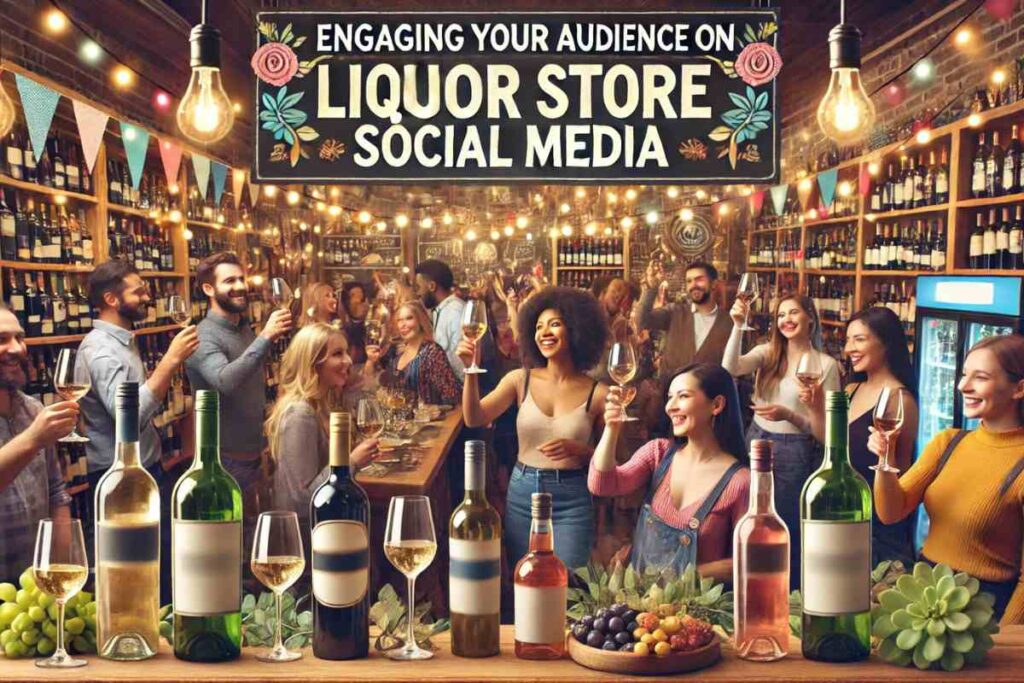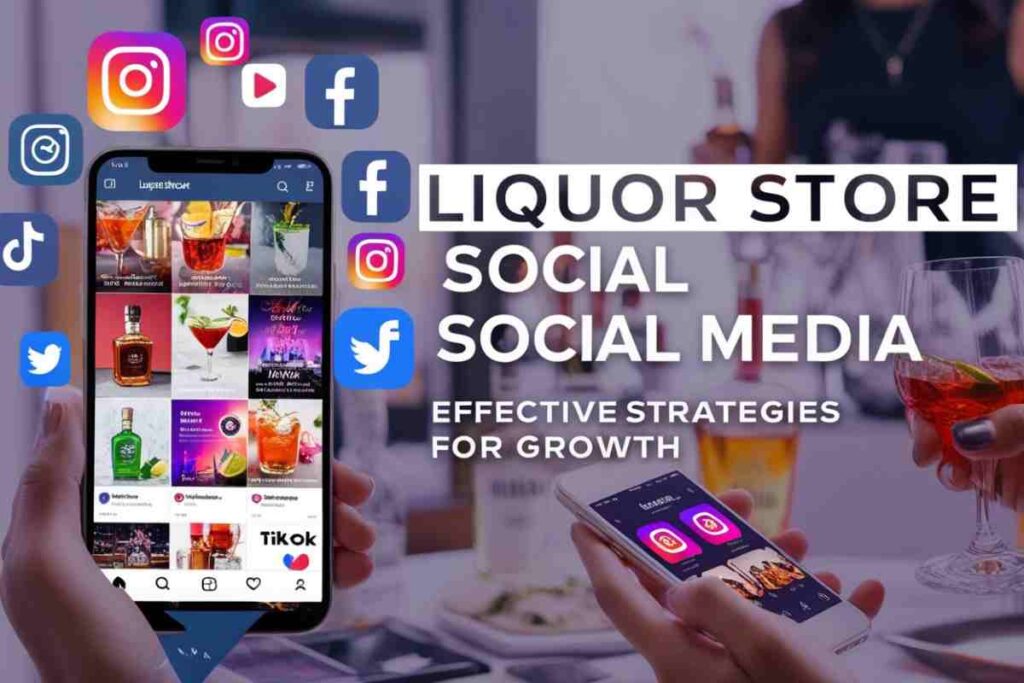In today’s digital age, social media has become an indispensable tool for businesses, and liquor stores are no exception, offering unique opportunities to connect with customers.
With the ability to connect directly with customers, showcase unique products, and foster a sense of community, social media provides liquor stores with unparalleled opportunities to stand out in a competitive market.
This guide dives into actionable strategies and creative approaches to help your liquor store leverage social media effectively, all while navigating the unique challenges and regulations of the alcohol industry.
Whether you’re looking to boost brand visibility, engage your audience, or drive sales, these tips will set you on the path to success.
Understanding the Importance of Liquor Store Social Media
What is Liquor Store Social Media?
Liquor store social media refers to the use of platforms like Facebook, Instagram, Twitter, and TikTok to promote liquor stores, engage with customers, and create a community around your brand.
The unique nature of liquor retailing means that social media strategies must be tailored to adhere to legal regulations while still being engaging and informative.
Why Liquor Store Social Media Matters
In today’s market, where consumers increasingly rely on digital platforms to discover products, liquor store social media serves multiple purposes:
- Increases Brand Awareness: Well-executed social media campaigns can introduce your liquor store to a broader audience.
- Engages Customers: Social media allows for direct interaction, enabling you to build relationships with your customers.
- Drives Traffic to Your Store: Promotions and events shared on social media can lead to increased foot traffic.
- Enhances Customer Loyalty: Engaging content fosters a sense of community, encouraging repeat business.
The Growth of the Craft Spirits Industry
The craft spirits movement has significantly impacted liquor store social media strategies. With consumers seeking unique and high-quality products, liquor stores must adapt their social media efforts to highlight these offerings. You can attract a dedicated customer base by showcasing local distilleries, craft cocktails, and unique tasting events.
Crafting Your Liquor Store Social Media Strategy

Identify Your Target Audience
Before diving into liquor store social media, it’s essential to understand your audience. Consider factors like:
- Demographics: Age, gender, location, and income level.
- Interests: What types of spirits do they prefer? Are they interested in cocktail recipes or local distilleries?
- Online Behavior: Which social media platforms do they use most frequently?
Creating detailed customer personas will guide your content strategy and help ensure your posts resonate with your audience.
Audience Research Techniques
Understanding your audience is key to creating effective liquor store social media strategies. Here are some concise techniques for audience research:
Benefit: Reveals data-driven insights into who engages with your content and how they interact with your brand.
Surveys and Polls
Conduct surveys or polls via social media or email to gather direct feedback on customer preferences and interests.
Benefit: Provides insights into what products, promotions, or content resonate with your audience.
Social Media Listening
Monitor social media conversations related to your brand or industry using tools like Hootsuite or Sprout Social.
Benefit: Identifies customer sentiments, trends, and topics that are relevant to your audience.
Customer Personas
Create detailed profiles representing your ideal customers based on demographics, interests, and purchasing behavior.
Benefit: Guides your content creation and marketing strategies to align with your target audience’s preferences.
Competitor Analysis
Study competitors’ social media profiles to see what type of content engages their audience.
Benefit: Helps identify gaps in your strategy and potential opportunities to stand out.
Website and Social Media Analytics
Use tools like Google Analytics and social media insights to analyze visitor demographics and behavior.
Choose the Right Platforms
Not all social media platforms are created equal, especially for liquor store social media. Here’s a breakdown of the most effective platforms:
| Platform | Best For |
|---|---|
| Visual content, product showcases, stories | |
| Community building, events, promotions | |
| Quick updates, customer interaction | |
| TikTok | Creative videos, engaging younger audiences |
| YouTube | In-depth tutorials, cocktail recipes |
Develop a Content Plan
A well-structured content plan is key to successful liquor store social media. Your plan should include:
- Content Types: Mix promotional posts, educational content, and user-generated content.
- Posting Schedule: Consistency is crucial; aim for regular posts (e.g., 3-5 times a week).
- Themes: Plan themes for different days, such as “Mixology Monday” for cocktail recipes or “Throwback Thursday” for showcasing classic spirits.
Create Engaging Content
Engaging content is at the heart of effective liquor store social media. Here are some content ideas to inspire you:
- Product Highlights: Feature new arrivals or unique spirits.
- Cocktail Recipes: Share creative recipes that use your products.
- Behind-the-Scenes: Show the day-to-day operations of your store or the process of selecting products.
- Customer Spotlights: Encourage customers to share their experiences with your products.
Utilize Visuals and Branding
Visual content significantly impacts engagement. Ensure your visuals align with your brand identity. Consider using:
- High-Quality Images: Invest in professional photography for product shots.
- Consistent Branding: Use the same color scheme, fonts, and logo across all platforms.
- Videos: Short videos or stories can be highly engaging, showcasing products or events.
Engaging Your Audience on Liquor Store Social Media

Case Studies of Successful Liquor Store Social Media Campaigns
Here are concise examples demonstrating effective liquor store social media strategies:
1. The Spirit House
Focus: Community Engagement
Platforms: Facebook, Instagram
Overview: Hosted live Q&A sessions with local distillers, fostering direct customer interaction.
Results: 40% increase in followers and 25% boost in sales during events.
2. Cheers Liquors
Focus: Promotions
Platforms: Instagram
Overview: Launched a “Bottle of the Month” promotion with exclusive discounts and cocktail recipes.
Results: 50% increase in post engagement and 30% rise in featured product sales.
3. Crafted Spirits Emporium
Focus: Interactive Events
Platforms: Instagram, TikTok
Overview: Organized tasting events with photo opportunities and a unique hashtag for social sharing.
Results: 60% increase in foot traffic and over 100 attendees per event.
4. City Spirits
Focus: User-Generated Content
Platforms: Facebook, Instagram
Overview: Ran a cocktail competition, showcasing customer recipes on social media.
Results: Over 200 user-generated posts and a 70% increase in engagement.
5. Eco Spirits
Focus: Sustainability
Platforms: Instagram, Twitter
Overview: Promoted eco-friendly brands and organized community clean-up events.
Results: 15% increase in sales of sustainable products and strengthened community ties.
Run Promotions and Contests
Promotions and contests are excellent for boosting engagement and visibility. Here are some ideas:
- Giveaways: Offer a prize for tagging friends, sharing your post, or using a specific hashtag.
- Discounts: Promote special discounts for social media followers.
- Events: Host in-store tastings or virtual events that require registration via social media.
Leverage User-Generated Content
Encouraging customers to share their experiences with your products can greatly enhance your brand’s authenticity. Consider:
- Hashtags: Create a unique hashtag for your store to track user-generated content.
- Reposts: Share user-generated content on your profiles to foster community.
- Testimonials: Showcase positive reviews and testimonials from satisfied customers.
Collaborate with Influencers
Influencer partnerships can expand your reach and credibility. When selecting influencers for liquor store social media, look for:
- Local Influencers: They can promote your store to their followers, creating a more personal connection.
- Relevant Niches: Choose influencers who focus on food, drink, or lifestyle content that aligns with your brand.
Monitor and Respond to Feedback
Engagement on liquor store social media requires active monitoring. Respond to comments and messages promptly to show that you value your customers’ opinions. Address any negative feedback professionally, turning potential issues into opportunities for improvement.
Analyze Your Performance
Regularly analyze your social media performance to refine your strategy. Key metrics to monitor include:
- Engagement Rate: Likes, shares, comments, and overall interaction.
- Follower Growth: Track your growth over time to assess the effectiveness of your campaigns.
- Website Traffic: Use analytics tools to measure how much traffic is driven from social media to your website.
Detailed Analytics and Tools for Liquor Store Social Media

To maximize the effectiveness of your liquor store social media strategy, leveraging analytics and tools is crucial. These resources help you measure performance, understand audience behavior, and refine your marketing efforts.
Key Metrics to Track
Engagement Rate
- Definition: Measures interactions (likes, comments, shares) relative to your follower count.
- Importance: Indicates how well your content resonates with your audience.
Follower Growth
- Definition: Tracks the increase or decrease in your follower count over time.
- Importance: Helps assess the effectiveness of your campaigns and overall brand appeal.
Website Traffic
- Definition: Monitors the number of visitors directed to your website from social media platforms.
- Importance: Shows how well your social media efforts drive potential customers to your store or website.
Conversion Rate
- Definition: Percentage of visitors who complete a desired action, such as making a purchase or signing up for a newsletter.
- Importance: Measures the effectiveness of your social media promotions in generating sales.
Content Performance
- Definition: Analyzes which types of posts (videos, images, text) perform best.
- Importance: Helps inform future content strategy by identifying what engages your audience.
Tools for Analytics
Benefits: Allows you to analyze and compare performance across different platforms
Google Analytics
- Features: Tracks website traffic, user behavior, and conversion rates.
- Benefits: Provides in-depth insights into how social media impacts overall website performance.
Facebook Insights
- Features: Offers data on page performance, audience demographics, and engagement statistics.
- Benefits: Helps refine your Facebook content strategy based on user interactions.
Instagram Insights
- Features: Shows engagement metrics, reach, and follower demographics.
- Benefits: Enables you to tailor content specifically for your Instagram audience.
Hootsuite
- Features: Centralized platform for managing multiple social media accounts and scheduling posts.
- Benefits: Provides analytics for all connected accounts, making it easier to track overall performance.
Sprout Social
- Features: Offers comprehensive reporting on engagement, follower growth, and post performance.
Compliance and Legal Considerations in Liquor Store Social Media
Understanding Legal Regulations
When engaging in liquor store social media, it’s essential to be aware of the legal regulations surrounding alcohol advertising. Here are key points to consider:
- Age Restrictions: Ensure your content targets an audience that is of legal drinking age.
- Content Guidelines: Familiarize yourself with local laws regarding alcohol promotions, especially regarding misleading information or excessive consumption.
- Tied House Laws: Be cautious about relationships with suppliers and how you present them on social media.
Best Practices for Compliance
To ensure your liquor store social media efforts remain compliant:
- Educate Your Team: Train your staff on legal considerations and best practices for social media use.
- Regularly Review Content: Before posting, review content to ensure it adheres to regulations.
- Consult Legal Experts: If in doubt, consult legal professionals familiar with liquor advertising laws.
Future Trends in Liquor Store Social Media
Embracing New Technologies
As technology evolves, so do social media trends. Some trends to watch in liquor store social media include:
- Augmented Reality (AR): Brands are starting to use AR to create interactive experiences, such as virtual tastings or product demos.
- Shoppable Posts: Many platforms are introducing features that allow users to purchase directly through posts, streamlining the shopping experience.
Sustainability and Ethical Practices
Consumers are increasingly concerned about sustainability and ethical practices. Incorporating these values into your liquor store social media strategy can resonate with your audience:
- Promote Sustainable Products: Highlight eco-friendly brands and practices.
- Community Involvement: Showcase your store’s involvement in local causes and initiatives.
check out our article on elevating your brand with custom social media marketing packages.
Conclusion
Liquor store social media is an essential tool for modern marketing, offering unique ways to connect with customers, build a community, and drive sales.
By understanding your audience, implementing a creative content strategy, and staying compliant with regulations, you can strengthen your store’s online presence.
Keep evolving by tracking performance, embracing new trends, and delivering value to your audience for long-term success in the competitive liquor market.
FAQS
Here are 8 FAQs with concise answers:
What is liquor store social media?
Liquor store social media refers to using platforms like Instagram and Facebook to promote your store, engage with customers, and increase sales.
Which social media platform is best for liquor stores?
Instagram, Facebook, and TikTok are ideal for showcasing products, running promotions, and engaging with a diverse audience.
How can I engage customers on liquor store social media?
Post interactive content, respond to comments quickly, run promotions, and share user-generated content to boost engagement.
Are there legal restrictions on liquor store social media?
Yes, ensure your content follows age restrictions and guidelines on alcohol promotions set by local laws to stay compliant.
How can influencer marketing help my liquor store?
Local influencers can promote your store, increasing visibility and building trust with their followers, leading to more customers.
What types of content should I post for my liquor store?
Share a mix of product highlights, cocktail recipes, behind-the-scenes looks, customer stories, and event promotions to keep content fresh.
How often should I post on liquor store social media?
Aim for regular posts 3-5 times a week to keep your audience engaged without overwhelming them.
How do I measure success on liquor store social media?
Track metrics like engagement rate, follower growth, website traffic, and conversion rate to evaluate your social media performance.




